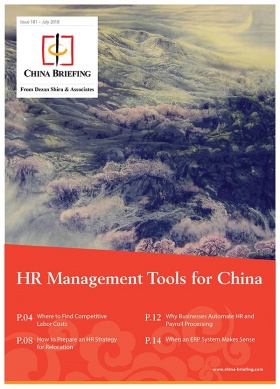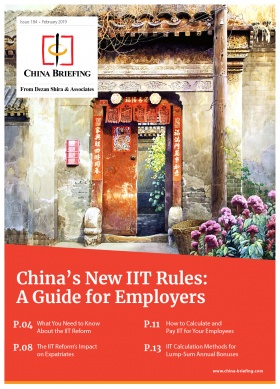Sexual Harassment under China’s Law: What Employers Need to Know
By Ramya Bodupalli and Alexander Chipman Koty
The #MeToo movement has exposed sexual harassment and inappropriate behavior around the world, and China is no exception. In China, university campuses have been the focal point of the movement, with students publicly accusing several high-profile university professors of sexual harassment.
Sexual harassment in China, however, is not limited to university campuses. According to one report by Hong Kong’s City University, 80 percent of Chinese women experience sexual harassment at some point in their working lives.
The #MeToo movement has begun to expose the prevalence of sexual harassment in workplaces and other institutions.
Given the pervasiveness of sexual harassment in the Chinese workplace – as well as the lack of state support for victims – businesses are finding it crucial to develop formal processes to handle such issues, while those with existing mechanisms are reevaluating and strengthening their systems.
Sexual harassment under China’s law
Chinese law prohibits sexual harassment in the workplace. However, the law does not clearly define what constitutes sexual harassment, nor does it specify specific punishments for such acts. The law therefore puts the onus of creating a workplace free from sexual harassment on the employer.
Laws concerning sexual harassment in China are expressed in various national and local statutes rather than a single comprehensive law. Notable statutes include:
- Article 40 of the Law of the PRC on the Protection of Women’s Rights and Interests: prohibits sexual harassment of women in the workplace. This statute also provides the victim of such harassment the right to file internal complaints in their respective units or departments.
- Article 32 of the Regulations for the Implementation of Law of the PRC on the Protection of Women’s Rights and Interests in Shanghai: further defines sexual harassment as possible through language, text, images, electronic message, and physical behavior.
- Article 237 of the Criminal Law of the PRC: defines indecent assault as “coercively molest others or humiliate women by violence, threat or other means”.
Several verdicts given by Chinese courts also offer some understanding of what constitutes sexual harassment and what is expected of employers to prevent such cases.
For instance, the Intermediate Court of Zhongshan, Guangdong Province, ruled that sexual harassment includes unsolicited sexual action that threatens the security of the victim and impairs their dignity.
Despite the presence of formal laws, in practice victims of harassment usually find it difficult to have them meaningfully enforced.
Workplace intimidation, vague definitions of what constitutes sexual harassment in China, high burdens of proof for the accuser, and lenient punishments even for those found guilty all contribute to a difficult environment for victims to come forward.
Preventing harassment in the workplace
The lack of reliable legal mechanisms for victims of harassment to turn towards makes strong workplace controls and processes all the more important to curb inappropriate behavior.
In the absence of a clear and uniform legal protocol for handling sexual harassment cases, employers must clearly define what types of behaviors are inappropriate and establish a strict anti-harassment code and culture.
This code must written into the company’s employee handbook, and its importance emphasized during employee onboarding.
Examples of types of behavior to explicitly prohibit can include, among others:
- Unwanted touching, bodily contact, and flirting;
- Repeated requests for dates and get-togethers;
- Inappropriate jokes, comments, and gestures; and
- Playing inappropriate videos and music.
Employers should note that the examples included within the handbook are not exhaustive, and that other behaviors can also constitute sexual harassment. These behaviors, the handbook should state, are unacceptable, and will result in an investigation and specific punishments.
The handbook should also explain the authority of the employer to investigate sexual harassment complaints and the capacity to follow up complaints with necessary action.
Further, the handbook must stipulate the protocol for employees to follow to report an instance of sexual harassment.
Depending on the size and structure of the business, this can include reporting to human resources (HR), the relevant manager or supervisor, an owner or executive, or a dedicated sexual harassment complaint system. For foreign companies or small branch offices, employees should be given the option to report directly to headquarters.
Victims should be given multiple options for reporting so that they can choose the option that they feel most comfortable with.
For example, an employee might trust their manager to deal with the issue and want to report directly to him or her, whereas another might be uncomfortable reporting to a manager they work with daily. In other circumstances, the manager might be the harasser or have a close relationship with the harasser.
The employer must clearly communicate the anti-harassment code to all employees.
In case the employer seeks to revise its regulations, it must first consult a representative of the employees or union to seek their opinions. Once the amendments are made, they should be communicated in written form to the employees.
The employer can also take the additional measure of training employees about sexual harassment prevention and the various mechanisms available to report workplace sexual harassment.
Further, the employer can provide information about additional resources that harassment victims can access, such as a list of relevant NGOs.
The company should enlist the services of external legal experts to ensure that the company policy is compliant with Chinese laws, and can also conduct an HR audit to evaluate the strength of internal policies.
Dealing with instances of harassment
In the event of a sexual harassment complaint being filed, the employer must investigate the matter. During the investigation, the employer must be cautious not to infringe upon the rights of privacy and reputation of both the accuser and the accused.
For serious incidents and allegations, the employer should contact law enforcement officials immediately. The employer can also provide counselling services to the victim in order to help alleviate any trauma.
Employers can terminate employees found at fault of sexual harassment under certain conditions.
As per Article 39 (2) of the Labor Contract Law, the employer has the right to end the contract of an employee who “significantly violates the rules and regulations” of the workplace. Employers can affect such termination without paying any compensation.
To exercise this right, the employer must describe sexual harassment as a “significant violation” in the company’s employee handbook and all employees must be made aware of such regulations upon joining the workplace.
If the contract is terminated without these conditions being met, the employee can demand compensation or for the continuation of the contract.
Alternatively, the employer can choose to engage a third party to investigate the sexual harassment complaint. This would ensure the impartiality of the process and gain the trust of both the accuser and the accused, and show other employees that sexual harassment is taken seriously.
Employer responsibility
From the employer’s perspective, the absence of a unified law on sexual harassment gives reason to establish a strict anti-sexual harassment code.
However, employers should note that they can be held liable under law if an investigation into a sexual harassment complaint violates the accused’s right of reputation and right of privacy.
As such, employers must have a clear understanding of what is and what is not legally permitted during an investigation.
If a court finds that an employer is at fault for failure to prevent sexual harassment, they may be required to compensate the victim and may also be fined.
For instance, Sichuan province requires the employer to compensate the victim if they have suffered physical or psychological damage.
Further, the Supreme People’s Court has also ruled that when an employee has caused personal injury to another employee, the employer is responsible to compensate the victim. The nature and amount of the compensation is left to the employer to decide.
The employer’s discretion to set their own penalties, combined with the mild nature of other legal penalties that may be incurred, contribute to the prevalence of workplace sexual harassment in China.
As such, it is all the more important that employers emphasize that inappropriate behavior is not tolerated in the workplace, and to communicate the channels that employees can use to file complaints.
A strong framework to deal with sexual harassment in the workplace contributes towards boosting office morale, increasing work efficiency, and, most importantly, addressing systemic discrimination and abuse.
About Us
China Briefing is produced by Dezan Shira & Associates. The firm assists foreign investors throughout Asia from offices across the world, including in Dalian, Beijing, Shanghai, Guangzhou, Shenzhen, and Hong Kong. Readers may write china@dezshira.com for more support on doing business in China.
- Previous Article Hong Kong’s New Two-tiered Profits Tax
- Next Article Confusion over Dispute Resolution at China’s New Belt and Road Courts







